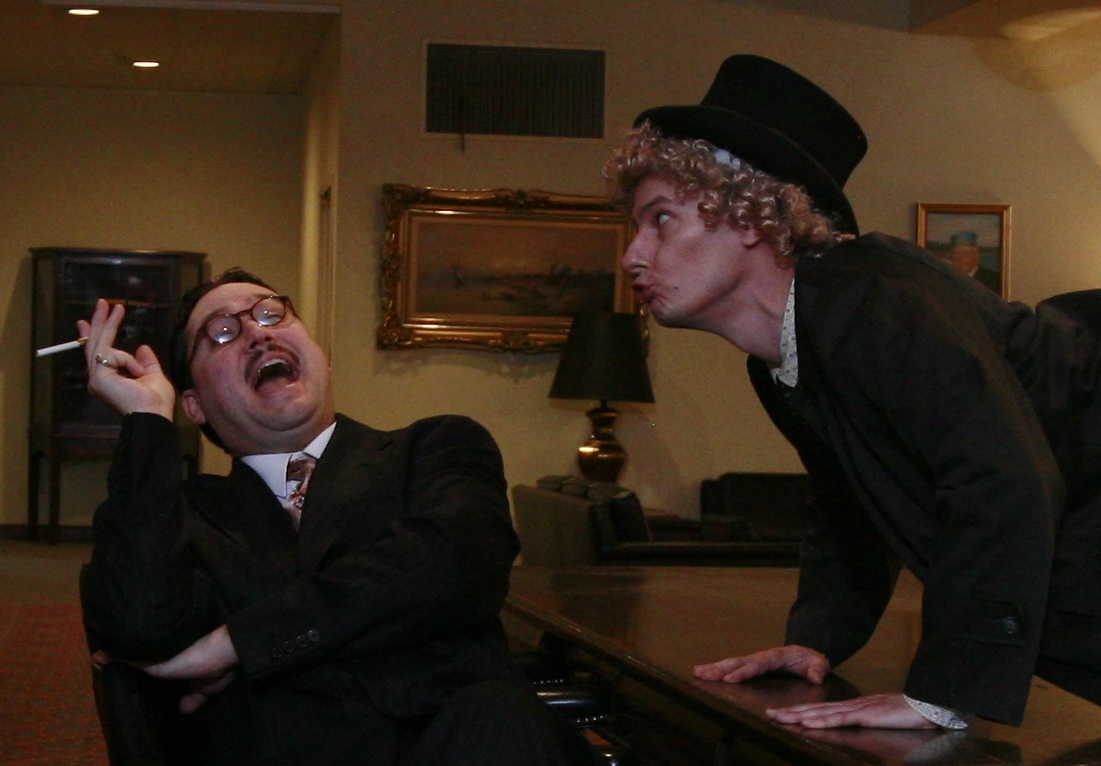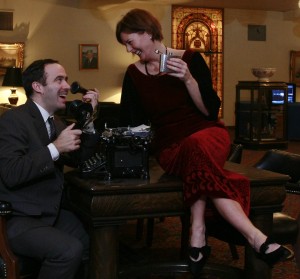The big buzz this week on Portland’s art scene is Friday’s official kickoff of Fertile Ground, a citywide festival of new plays big, small and in between. The sheer ambition of this thing is impressive and endearing and a little scary: How ever will we manage to get to all this stuff?
Well, we won’t.
But we did get a head start over the weekend, taking in last Friday’s opening night of Nancy Keystone’s gigantic Apollo at Portland Center Stage and, on Saturday night, a preview performance of the new and improved Vitriol and Violets, this time with songs and lyrics by the astute and clever jazz composer and pianist Dave Frishberg.
In the theater world “new” plays almost always emerge out of a long process, and both of these have, well, a little history behind them, in a couple of senses. Keystone’s been playing with Apollo for eight years, and its first two acts have been produced before, in Los Angeles. Act Three, funded in part by Center Stage, now joins them for the first time in this new production, creating the complete play. V&V, the Algonquin Round Table play written by Shelly Lipkin, Louanne Moldovan and Sherry Lamoreaux, has also been around the block with a couple of previous work-in-progress productions. This one is the first with Frishberg’s witty songs, and it’s also undergone a lot of streamlining (a few characters have been banished to the wings) and some welcome shaping, making it feel more like a finished play — although the authors say they’re still making adjustments.
 More to the point, both plays are about the American character, as measured through real historical characters and events, and both deal with the gap between the buoyant public perception and the tougher reality of the historic episodes they choose to portray.
More to the point, both plays are about the American character, as measured through real historical characters and events, and both deal with the gap between the buoyant public perception and the tougher reality of the historic episodes they choose to portray.
Oddly, they go about their similar tasks from almost opposite directions.
Keystone’s Apollo is epic theater — “total theater,” this sort of thing is sometimes called — with a grandiosity that splashes wide, wide, wide and occasionally focuses down to the human particular. It comes at you in waves of choreographed sight and sound. And out of its cold sweep of history, a few vivid personalities eventually emerge.
Vitriol and Violets is far more traditional in its theatricality, reeling you in with the particular human comedy of outsize characters such as Alexander Woollcott and Dorothy Parker and letting the history tumble out almost unannounced. Having seduced you with laughter, it doesn’t announce its more serious attentions: It quietly lowers the boom.
Apollo takes two threads of American history — the space program and the civil rights movement — and slowly weaves them into a complementary strand. That’s VERY slowly. On opening night the show lasted about three hours and forty-five minutes, stretching quite a few theatergoers beyond the breaking point: Scattered seats turned up empty after the first act, and after the second intermission, the auditorium took on definite signs of pattern baldness. Despite its laudable ambitions the play suffers from a certain self-indulgence, and I’m guessing it could easily lose forty-five minutes and gain a lot of vitality in the process. At first Keystone’s careful (and literal) choreography of the actors irritated me with its pointed artificiality. They seemed like well-trained puppets, dancing on her string, and I’m wary of that kind of rigid control.
After a while, though, I began to like the swells and recessions, the operatic motifs (think Wagner, not Handel), the exaggerated body language, the visual artist’s eye for image, the rapid play of projections and the ingenious wall of cardboard boxes that made the stage look like the warehouse in the final scene of Raiders of the Lost Ark and that the actors, in a complex choreography of comings and goings, shifted around the space to create an ever-changing physical environment. Like a composer, Keystone has created a rhythm with recurring themes and variations, and if you can’t surrender to the rhythm you can’t feel the show. Still, there’s no getting around it: There’s simply too much here. Keystone needs to pick up her scissors and start making some radical cuts.
It might also help if she gave her hammer a rest. In spite of its fascinating dips into the historical record, Keystone’s script carries a sort of breathless moral outrage over matters that she presents as simple but that are, in fact, complex.
Perhaps her central question is this: How could the United States morally justify bringing the German rocket scientists Werner von Braun and Arthur Rudolph to run our own space program when they had been members of the Nazi Party and had very likely committed war crimes? That’s a fair and troublesome and complex question. But by putting the American “defense” in the mouth of a fatuous military man whom the audience is invited to ridicule, she stacks the deck, weakening her own argument by denying its opposite a fair hearing. On the other hand, she bracingly suggests that the space program — which was opposed by many civil rights and anti-poverty leaders because it ate up money that might have gone instead to social programs — actually had an unintended beneficial impact on the civil rights movement.
Apollo has a certain coldness, a lack of human touch, which is the downside to the upside of Keystone’s technical artistry. She’s so interested in the piece’s epic theatricality that the people who populate it — the people who are, after all, both the makers and victims of the history she tells — seem almost like afterthoughts. At times it’s tough to tell whether she’s more interested in her story or in the heightened technical ways she uses to tell it. I suspect she wants to fuse the two, but it doesn’t always work.
Yet I’m glad I saw Apollo: I admire it. It bites off a huge chunk of ambition, and if it doesn’t get it all chewed, it’s not for lack of trying. Keystone DOES have a fascinating visual approach to theater (in approach, if not particularity, she’s like Julie Taymor) and her radical approach to storytelling is invigorating. Keystone’s made sure this production is as smooth and sharply focused as she can make it: Apollo may be long, but it’s not sloppy.
And if the play ends up more for the head than the heart, it also has some potent emotional moments: the ex-Nazi Rudolph’s confusion and grief, in his old age, at being abandoned by his adopted country; Nazi hunter Eli Rosenbaum’s moral awakening; the thrilling, heartrending scene in a whites-only Southern diner when several protesting African Americans come to sit in and the waitress, also black, takes off her apron and joins them. That’s history, folks. That’s drama, too.
******************************
So is Vitriol and Violets about history — a history of the Roaring ’20s, and of the clutch of New York wits who put the fizz in the gin — but this is a much more personal, gossipy, bon mot-driven history: a history of the American heart.
I’m not going to get into a lot of specifics about the production itself, because I saw it in preview, a week before opening night, and although it was often funny and often moving, it was still getting its sea legs: a wobble here, a memory lapse there, a waiting for things to snap in. But if it ends up with the sharpness that the script demands, it could wind up a legitimate hit. A few things clearly were already clicking: Joe Thiessen is almost shockingly good as the self-promoting wit Alexander Woollcott; Isaac Lamb is almost as appealing as the slobby columnist and moral compass Heywood Broun; Ted Roisum is his usual stellar self as the Algonquin Hotel waiter/narrator (and in a brief, chilling scene as the doomed Bartolomeo Vanzetti of Sacco and Vanzetti infamy); and that guy Frishberg can really write a song.
The tough thing about writing a play about the Algonquin wits — “The Vicious Circle,” as they’ve also been named — is editing: There’s way too much good material available for any one play. The second toughest thing, for much the same reason, is settling on a cogent theme. This time around, the V&V authors have gone a long way toward solving both problems. Even with the addition of Frishberg’s six songs (this is a play with music, not a musical play, and it works well that way) the show is crisper and tighter than in its previous incarnations. Its first act is all bubble and wit, the allure of the players in the Algonquin game: It’s the fascinating, urban-evolving America of boobs and sophisticates as imagined and promulgated by the eternal sophomores of the Round Table. In Act Two, times change and things begin to break up: America, it turns out, is a tougher place than the wits imagine, and while many of them refuse to grow up, they still chafe at the limits they’ve set on themselves.
The play works between the poles of Woollcott’s joke-at-any-expense shallowness — he’s revealed to be, in his worst moments, vindictive and a bigot — and Broun’s growing moral depth as an ardent defender of Sacco and Vanzetti and his compassion for the rights of common people, a quality that most of his luncheon companions singularly lack. Harold Ross, too, spells out a middle road between wit and social conscience in his statement of purpose for the magazine he’s trying to start, The New Yorker. And the great, brittle Dorothy Parker is caught suicidally between her success as the mistress of the one-liner and her firm belief that that’s not enough, that she’s not engaging her society or her talent, that she’s a failure.
Frishberg, composer of such brittle gems as My Attorney Bernie, is an ideal match for the Algonquin style: In his approach to a song, he’s something of a contemporary Cole Porter. Consider these lyrics from his song about Parker’s many suicide attempts:
Suicide number one was a failure
Suicide number two didn’t score
Number three she got sick
But that didn’t do the trick
Now this could be lucky number four!What’s your plan, Mrs. Parker? From a window will you leap?
Will you overdose with sedatives and just drop off to sleep?
Will you whimper, will you yell,
Will you howl like holy hell?
Will you die, Mrs. Parker, will you die?
Toujours gai, Mrs. Parker, toujours gai.
Except, as it turns out, when you’re not.


